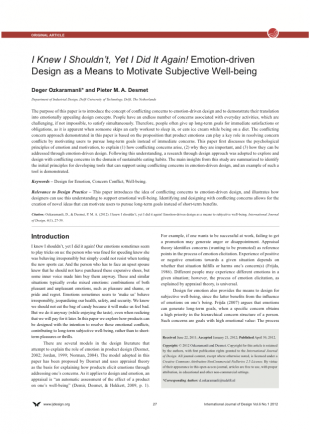The purpose of this paper is to introduce the concept of conflicting concerns to emotion-driven design and to demonstrate their translation into emotionally appealing design concepts. People have an endless number of concerns associated with everyday activities, which are challenging, if not impossible, to satisfy simultaneously. Therefore, people often give up long-term goals for immediate satisfactions or obligations, as it is apparent when someone skips an early workout to sleep in, or eats ice cream while being on a diet. The conflicting concern approach demonstrated in this paper is based on the proposition that product emotions can play a key role in resolving concern conflicts by motivating users to pursue long-term goals instead of immediate concerns. This paper first discusses the psychological principles of emotion and motivation, to explain (1) how conflicting concerns arise, (2) why they are important, and (3) how they can be addressed through emotion-driven design. Following this understanding, a research through design approach was adopted to explore and design with conflicting concerns in the domain of sustainable eating habits. The main insights from this study are summarized to identify the initial principles for developing tools that can support using conflicting concerns in emotion-driven design, and an example of such a tool is demonstrated.
Citation
Ozkaramanli, D., & Desmet, P. M. A. (2012). I knew I shouldn’t, yet I did it again! Emotion-driven design as a means to subjective well-being. International Journal of Design, 6(1), 27-39.




